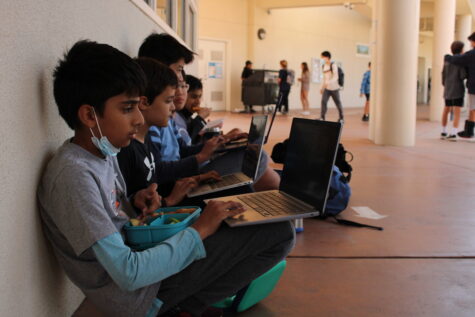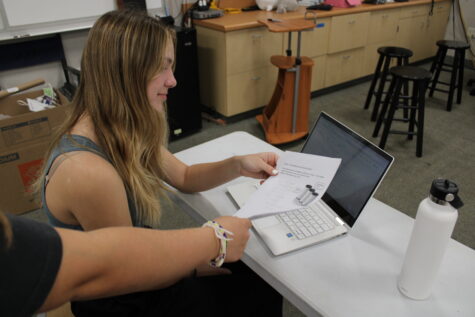Debatable Opinions on Schoolwork
Students and teachers discuss whether homework is valuable or unnecessary
When it comes to after school work, opinions can vary. Students and teachers form contrasting opinions. Some believe that homework is very unnecessary, while others believe the exact opposite. After a long, seven hour day at school, extra work at home can seem very stressful. However, the additional time spent on school work has proven to be extremely beneficial towards students’ grades in classes.

Experiences tend to differ based on the teachers each student is given at the beginning of the school year.
According to a study conducted by Front Range Christian School, “when middle school students were assigned more than 90–100 minutes of homework per day, their math and science scores began to decline.” Yet, homework is shown to improve test scores in “9th through 12th graders on American history,” according to Duke University.
Calista Chun balances 2+ hours of tennis along with hours of work when she gets home from school. Considering she has some of the most hardcore teachers at school, she is constantly up late at night doing homework and studying for tests in most of her classes. “Homework does cause me a lot of stress. A lot of times, because I play sports too, I have to stay up really late finishing all of it. I don’t even really think it is beneficial to me and my grades,” Calista said.
Frederick Prelle has almost the opposite point of view on homework. With after school activities taking up some of his weekdays, Frederick spends most of his time doing his homework. He said, “It gives me something to do when I have nothing planned after school, so I don’t just sit at home bored.” These two students have almost the same workload at home, but because of their different interests and schedules, one is affected differently than the other.

Teachers also have different opinions about homework. Each teacher has had their own experiences, which leads to different styles of teaching. For example, Ms. Mackey, History and ASB teacher at MBMS, teaches through project-based learning. Project-based learning teaches students through collaborative projects rather than independent work and tests every week. Some students learn and retain more information this way, while others like to stick with quizzes and tests. “The best part of project-based learning is how kids are in charge of their own learning. With this, there is a level of authenticity where they can use their own voices and make their own choices,” Ms. Mackey said. “When it comes to homework, I know that students have a lot of things that are going on in their life, so assigning homework every single night is not a productive use of their time in my opinion.”
Mr. Lee believes that the extra, at home, practice leads his students to remember and hold on to more of the information being taught in class. Throughout his eight years of teaching at MBMS, he has noticed his students become focused and retain more information with work to complete at home. Mr. Lee said, “Considering that students have seven classes a day, having a little review time at home is helpful.”
Overall, students and teachers have very different opinions when it comes to homework. These opinions almost completely depend on the different teachers a student has and the extracurricular activities that they participate in. Homework can be beneficial to some, but can be seen as a burden to others.
Bella Higgins is an eighth grade student at MBMS. Raised in the South Bay, Bella loves to go to the beach and especially enjoys swimming in the ocean....






